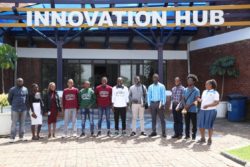15
03
.24
Trends and Challenges for the moderation of end-to-end encrypted communication in Zimbabwe
Trends and Challenges for the moderation of end-to-end encrypted communication in Zimbabwe was funded through a Global Challenges Research Fund award. We were delighted to partner with the Harare Institute of Technology (HIT) and to establish a productive research relationship with Mr Calvin Mugauri, Head of the Department of Information Security and Assurance at HIT, who was Principal Investigator for the project at HIT.
This collaborative project involved two elements:
Data collection in Zimbabwe.
This project served as a sister project the Horizon study ‘Everything in Moderation: Trends and Challenges for online communities from public forums to end-to-end encrypted communication. The Horizon project explored the use of end-to-end encrypted platforms such as WhatsApp, Signal, Telegram etc. for online communication. It particularly focused on the challenges of dealing with problematic content shared in end-to-end encrypted spaces. When hate speech, misinformation etc. is posted, there are fewer platform mechanisms available to moderate content since the communications are more ‘private’ than in other digital spaces. So what kind of legal mechanisms exist to address this kind of content, and how might users themselves seek to moderate content in their own end-to-end encrypted spaces?
Since Zimbabwe is a country where the use of an end-to-end platform (WhatsApp) is very widespread, the sister project gave us an opportunity to compare the two national contexts. We wanted to learn about how WhatsApp is used and moderated in Zimbabwe, and gauge whether this might provide some insights we could transfer to the UK context regarding potential moderation practices. The project team at HIT, led by Calvin, conducted a set of interviews with professional experts in Zimbabwe. These were stakeholders across the country with expertise and experience in internet communications and/or policy. The analysis of these interviews has so far produced a number of very interesting findings.
- WhatsApp is the ‘default’ app for many online users in Zimbabwe and be the central way in which citizens access the internet. It is used for a wide range of purposes such as banking, marketing, education, customer relations, and workplace communication in addition to social interactions.
- This popularity of use is more often connected to the convenience and affordability of WhatsApp rather than its end-to-end encrypted status. In a country with a limited telecommunications infrastructure, WhatsApp is highly useful as it does not require an expensive phone to run and offers a range of functions such as one-to-one and group chats, video calls, image sending etc. Users can also buy mobile phone data bundles specifically for WhatsApp, which makes using it further convenient.
- The use of WhatsApp in Zimbabwe contrasts very strongly with use in the UK. In Zimbabwe it is used far more often and for a greater number of purposes, in contrast to the UK where users are likely to use a wider range of apps, and WhatsApp is less associated with use outside of informal social interactions. However, moderating harmful content is a challenge in both country contexts.
- After our first round of analysis we were very intrigued by a new question: WhatsApp is the same app in Zimbabwe and the UK, so why is the use and experience of the app so different across these contexts? To help us address this question we are now looking at academic work on the concept of digital territories and territorialization [link https://www.hiig.de/en/the-internet-is-already-fragmented/]. We can see WhatsApp as a digital territory, but one that overlaps with the digital territories of different nation states. So in Zimbabwe the platform affordances of WhatsApp overlap with the laws, infrastructure and other arrangements put in place by the nation state. This shapes the specific context in which users access and experience WhatsApp, helping us to explain the differences we observe.
Knowledge exchange
A central aim of the project was to foster knowledge exchange between the University of Nottingham and HIT. We wanted to share expertise and ideas, and establish an ongoing relationship between our two institutions. We achieved this through our data collection and analysis collaboration as well as through other activities.
One activity was the conduct of a student challenge competition for computer science undergraduates at HIT. We challenged students to work in groups and put forward ideas about how they would address moderation challenges relating to end-to-end encrypted communications. The best teams were invited to create a video to explain their ideas further and prizes were given to the three videos judged to be the best. The videos were then posted online

A further activity was a knowledge exchange visit by HIT chief investigator Mr Calvin Mugauri to Nottingham. We were very pleased to welcome Calvin here for 12 days in March 2023. During this time he had meetings with the team members of the Horizon project and sister project to discuss analytic findings and create ideas for further funding bids. He also met researchers from research groups across the University – including the cyber security research group, Horizon Digital Economy institute, Mixed Reality Lab and Institute of Mental Health. These meetings provided an opportunity to discuss areas of shared research interest and we hope will form the basis of future collaborations.
Tags:
Calvin Mugauri,
E2E,
end to end encyryption,
everything in moderation,
Harare Institute of Technology,
Mixed reality Lab,
WhatsApp,
Zimbabwe














